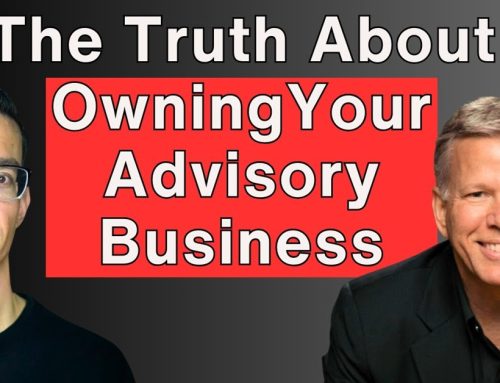In our media-obsessed world, advisors who are effectively communicating through a unique “voice” are reaping multiple rewards that go beyond generating new clients.
It’s so easy today to get your message out. You can start a blog, a podcast, tweet, post on Facebook and LinkedIn, write for online publications, send emails, and speak at conferences. And because it’s so easy, there’s so much noise that it’s hard to cut through the clutter. Yet there are certain advisors and industry leaders who have “found their voice” and are garnering the lion’s share of attention. You can be one of them.
When you find your voice, people will find you.
Through a several-step process of reflection, you can find and refine that voice in your head and unleash it to the public in a way that benefits everyone. You have a message. You have something to say. The world needs to hear you. And when you express yourself in your unique voice, your singular style, new clients and new opportunities start to show up.
3-Step Process to Find Your Voice
These 3 steps will help you zero in on what makes you, you:
1) Come up with “My 3 Adjectives.”
Regular readers of GTK and listeners of my podcast will recognize the “My 3 Words” exercise that I update and publish each year. In a similar way, identify 3 strong, bold adjectives that describe you, your personality, and what makes you interesting and unique. I know this may not be easy. But do a brain dump and quickly write down words that come to mind. Then you can go back and edit. The purpose of this exercise is to help you define the traits that make you different and interesting—and yes, in some way you are interesting and different. For a long list of adjectives that might spark your thinking, click here.
For example, three adjectives might be: feisty, methodical, and quirky. Now, if those 3 adjectives describe you, how might those traits show up in your writing or social media? If you’re feisty, you might take contrarian views or challenge other people’s thinking by showing how you disagree with them. If you’re methodical, you could backup your feistiness with research and data supporting your view. And if you’re quirky, you could toss in something unexpected in your writing like, “life, liberty, and the pursuit of a good bourbon.”
As a check on your 3 adjectives, ask someone who knows you well, perhaps a spouse or partner, what 3 adjectives they would use to describe you. If your words are not similar, then have a deeper discussion with your partner to understand what they’re seeing in you that you’re not seeing in yourself. We’re not looking for a “fake” voice here. We want the real you because that’s what people will respond to and become emotionally engaged with.
To continue reading the rest of this post, please register below with your email address.
2) Refine your voice to your audience.
Think about who is the target audience on the receiving end of your communication. What type of voice are they going to respond to and engage with? If you’re targeting C-suite executives, they may not respond to a snarky voice. By contrast, if you’re targeting A-list comedians, they might. (Of course, I’m stereotyping here.) Now, I’m not asking you to change your voice to something you’re not just to please your target audience. Instead, if you’re finding a mismatch, then either a) place more “voice” on the aspects of your personality that do connect with your audience or b) if that’s not workable, then maybe you need to find a different market that appeals to the type of person you really are—again, be real.
People can sense when you’re being fake. Plus, communicating in a fake voice just to please a certain audience will make you miserable. Go with who you are and let the people who like “the real you” become your fans and advocates. You only need a small number of devoted advocates to build a nice practice.
3) Spot and appreciate other voices.
Think of some of your favorite personalities. How would you describe their voices? Can you see how their voices draw attention to them? By reflecting on other strong voices that you’re familiar with, you’ll notice how that starts to create a brand around them. You’ll see how and why certain types of people are attracted to that voice. And you’ll be able to start connecting the dots on how you want to communicate your voice to your ideal audience.
Here are some examples of voices in our industry:
Michael Nathanson, the CEO of the Colony Group, has a law degree from Harvard, a LL.M. in taxation, and many other prestigious accolades. Today, I see his writings in periodicals ranging from Financial Advisor Magazine to Chief Executive Magazine. And he has a strong voice revolving around storytelling, methodical thinking (the lawyer coming out!), and contrary thinking. Check out two of his recent articles here and here. You might also like the podcast I did with Michael.
Dennis Morton is a top advisor and co-founder of the RIA Morton Brown Family Wealth. He’s become an active blogger on his own site and has found his voice by drawing on his military experience, his wirehouse background, and his lifelong interest in multi-disciplinary learning that combines finance with the humanities. I loved this recent article where he wrote about “the most valuable professional habit benefiting clients.” And this second article where he was able to connect golf, guitar playing, and The Grateful Dead to his personal stories and the risks of being a self-taught personal finance DIYer. You might also like the podcast I did with Dennis.
Ben Carlson is the Director of Institutional Asset Management at Ritholtz Wealth Management, a podcaster, and blogger. He’s developed an interesting voice around smart, insightful writing, connecting disparate non-financial events to being a better investor, and doing it all with a bit of sass and wit. This post about The 5 Types of Retirement Savers is a good example—and it even includes several GIFs for a touch of Buzzfeed humor. You might also like the podcast I did with Ben—that is, if I did one!
Make Your Voice Heard
The default position in our industry is to be a commodity, to take the road well-traveled, because, well, it’s easy and it doesn’t piss anybody off. That’s no longer tenable as technology is quickly displacing the average advisor. All of us have to up our game, “up skill,” and retool for a world where our ability to use communication to engage and cut through the clutter is more important than our access to products and investments.
It takes serious effort to differentiate yourself and your business from the also-rans. But the rewards for creating a unique voice are manifold. Yes, you’ll attract new clients. But equally important is how you’ll discover more about who you are and the liberation that comes from expressing who you are “with the volume on high.”
There are people out there right now who want and need to hear what you have to say. Make that happen by taking the time to find, refine, and make your voice heard.
Resources
– Values Clarification Toolkit Click here to download this FREE tool and start living your values.





